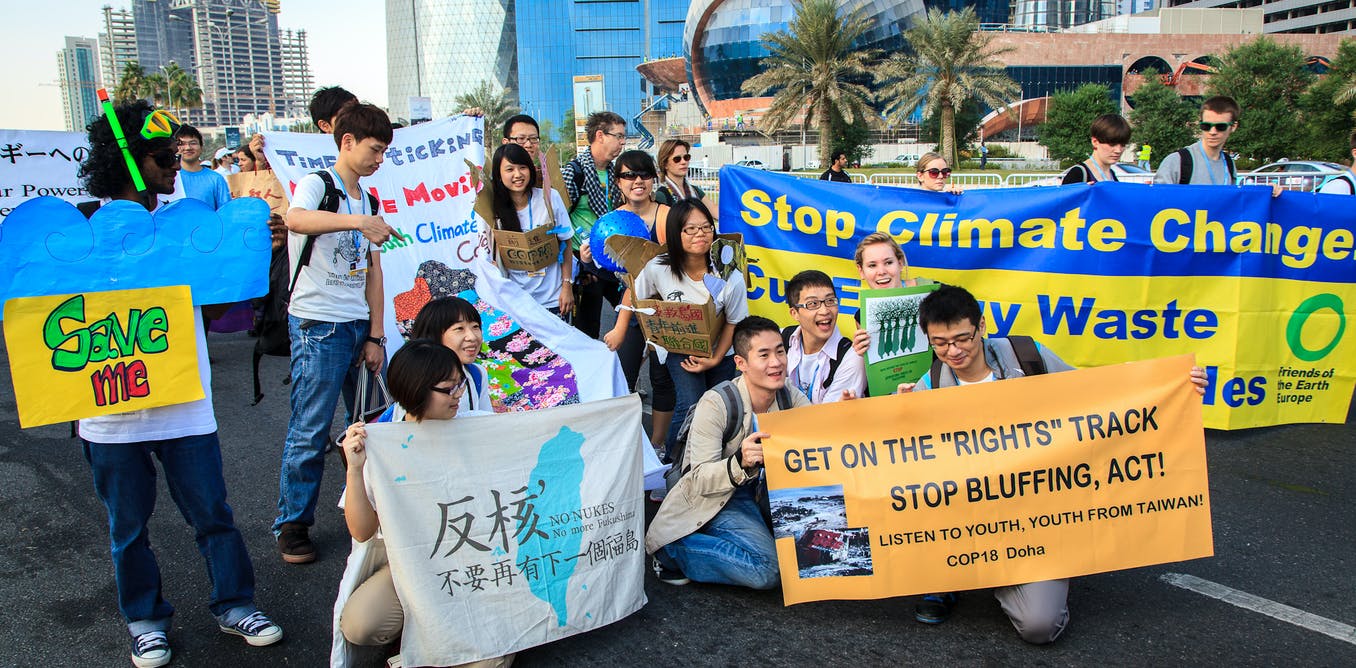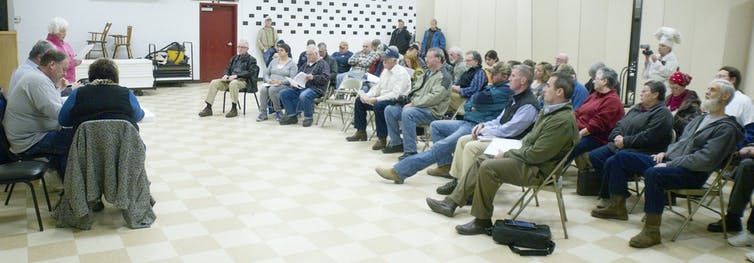Playing ‘serious games,’ adults learn to solve thorny real-world problems

It takes more than protest: demonstrators at a 2012 climate change conference in Doha, Qatar. Omar Chatriwala/flickr, CC BY-NC-ND
It is never easy for interest groups with conflicting views to resolve public policy disagreements involving complex scientific issues. To successfully formulate complex treaties, such as the recent Paris Climate Change Agreement, countries must find a way to meet the interests of almost 200 national representatives, while simultaneously getting the science right. Lowest common denominator political agreements that don’t actually solve the problem are useless.
Similarly, within countries, national policymakers need to mesh the conflicting concerns of public officials, civil society organizations and business interests to set health and safety standards that work. To do this, they must bring everyone up to speed on the scientific and technical aspects of the problem they are addressing. Merely wrangling a political agreement isn’t enough.
Likewise, at the municipal level, communities are confronting issues such as the local public health risks of climate change. They need to make sure that public officials and key segments of the public understand the problems and the responses most likely to work.
The standard approach is to hold public meetings where representatives of all interest groups gather and air their views. But public meetings alone will not produce informed decisions. First, stakeholders have to learn about the complex systems involved. Second, to negotiate a truly informed agreement, they have to understand the concerns of other groups. It is not easy to pull together agreements that will have widespread support. We need tools to highlight our common interests or trades we can all accept, instead of emphasizing our differences and disagreements.

Public meetings like this hearing on a hydraulic fracturing waste facility in Pennsylvania often fail to bring people together.
J.P. Pribanic/Flickr, CC BY-NC-ND
Finding common interests through games
We have been testing the use of role-playing games to promote collaborative decision-making by nations, states and communities. Unlike online computer games, players in role-playing games interact face-to-face in small groups of six to eight. The games place them in a hypothetical setting that simulates a real-life problem-solving situation. People are often assigned roles that are very different from their real-life roles. This helps them appreciate how their political adversaries view the problem.
Players receive briefing materials to read ahead of time so they can perform their assigned roles realistically. The idea is to reenact the tensions that actual stakeholders will feel when they are making real-life decisions. In the game itself, participants are asked to reach agreement in their roles in 60-90 minutes. (Other games, like the Mercury Game or the Chlorine Game, take longer to play.) If multiple small groups play the game at the same time, the entire room – which may include 100 tables of game players or more – can discuss the results together. In these debriefings, the most potent learning often occurs when players hear about creative moves that others have used to reach agreement.
It can take up to several months to design a game. Designers start by interviewing real-life decision makers to understand how they view the problem. Game designers must also synthesize a great deal of scientific and technical information to present it in the game in a form that anyone can understand. After the design phase, games have to be tested and refined before they are ready for play.
Research shows that this immersive approach to learning is particularly effective for adults. Our own research shows that elected and appointed officials, citizen advocates and corporate leaders can absorb a surprising amount of new scientific information when it is embedded in a carefully crafted role-playing game. In one study of more than 500 people in four New England coastal communities, we found that a significant portion of game players (1) changed their minds about how urgent a threat climate change is; (2) became more optimistic about their local government’s ability to reduce climate change risks; and (3) became more confident that conflicting groups would be able to reach agreement on how to proceed with climate adaptation.
Video from the New England Climate Adaptation Project inviting residents of Cranston, Rhode Island to participate in role-playing workshops on adapting their community to climate change.
Our conclusion is that “serious games” can prepare citizens and officials to participate successfully in science-based problem-solving. In related research in Ghana and Vietnam, we found that role-playing games had similarly valuable effects. While the agreements reached in games do not necessarily indicate what actual agreements may be reached, they can help officials and stakeholder representatives get a much clearer sense of what might be possible.
We believe that role-playing games can be used in a wide range of situations. We have designed games that have been used in different parts of the world to help all kinds of interest groups work together to draft new environmental regulations. We have brought together adversaries in energy facility siting and waste cleanup disputes to play a game prior to facing off against each other in real life. This approach has also facilitated decisions in regional economic development disputes, water allocation disputes in an international river basin and disputes among aboriginal communities, national governments and private industry.
In any situation where groups with different interests and values are likely to talk past each other or ignore scientific information in a political context, role-playing games can prepare them to deal with their differences more effectively.

Lawrence Susskind works for the MIT Science Impact Collaborative, the MIT Department of Urban Studies and Planning, the Program on Negotiation at Harvard Law School and the not-for-profit Consensus Building Institute. He has received funding from the U.S. National Oceanographic and Atmospheric Administration (NOAA) and the National Science Foundation (NSF).
Ella Kim does not work for, consult, own shares in or receive funding from any company or organisation that would benefit from this article, and has disclosed no relevant affiliations beyond their academic appointment.




